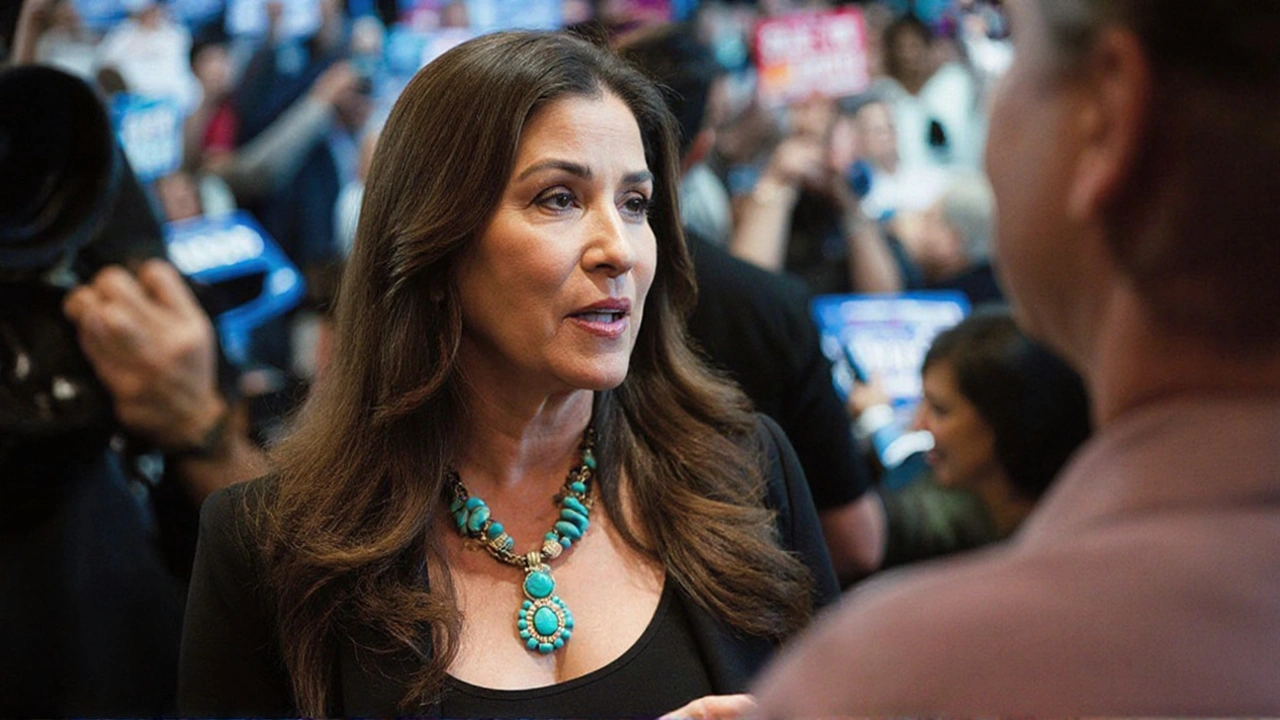26 Sep 2025
- 7 Comments
Historic Win Shifts Arizona’s Political Landscape
When the votes were counted on Tuesday night, the numbers left little room for doubt: Adelita Grijalva captured nearly seven‑in‑ten ballots in Arizona’s 7th Congressional District. The Associated Press called the race less than ten minutes after the first results rolled in, a clear sign just how decisive the win was. At 69% to 30%, her Republican opponent Daniel Butierez couldn’t even come close.
The victory matters far beyond the raw percentages. Grijalva becomes the first Latina from the Grand Canyon State to sit in the U.S. House of representatives, a milestone that many activists have chased for years. The celebration at Tucson’s El Casino Ballroom captured that feeling. More than a hundred people packed the venue, cheering louder than the band’s own music as she stepped onto the stage. The energy was electric, a mix of pride, relief and a sense that history was being rewritten right there in the desert.
The seat she’s filling was once held by her father, Rep. Raúl Grijalva, who died in March after a 20‑plus‑year tenure. His death triggered the special election, and Adelita’s decision to run was both a personal tribute and a strategic move by Democrats looking to keep the district in their column. Her win not only preserves her family’s legacy but also nudges the Republican majority in the House a little lower, a boost for Democrats heading into the next regular cycle.

What Grijalva Brings to Congress
Grijalva isn’t a newcomer to public service. For 20 years she sat on the Tucson Unified School District Governing Board, learning the ropes of education policy, budget battles and community outreach. In 2020 she made another first, becoming the inaugural Latina chair of the Pima County Board of Supervisors for District 5. She stepped down from that role earlier this year to focus on the congressional run, a decision that underscored her commitment to the seat her father left behind.
Her résumé has made her attractive to a variety of endorsers. Credit unions across Arizona rallied behind her, citing her long‑standing membership and her support for financial services that target underserved neighborhoods. The America’s Credit Unions PAC, along with the GoWest Credit Union Association, poured money and volunteers into her campaign.
The Working Families Party became another powerhouse ally. The group shelved $221,000 for a media blitz that saw television spots, digital ads and text blasts flood the district. Their volunteers knocked on more than 90,000 doors and mailed out direct‑to‑voter pieces, a ground game that helped translate name recognition into votes.
Beyond money, those endorsements signal where Grijalva’s policy priorities lie. She’s spoken repeatedly about expanding access to affordable credit, protecting public schools, and fighting for a living‑wage economy. Maurice Mitchell, the National Director of the Working Families Party, summed it up: there’s “real energy right now for a different kind of politics, one that puts working people first.” He expects Grijalva to be a “tireless fighter for working families in her district.”
The 7th District stretches across a massive swath of Southern Arizona, covering six counties that range from desert towns to sprawling ranch lands. The region’s issues are as varied as its geography: water rights, border security, Native American tribal affairs, and a growing demand for renewable energy jobs. Grijalva’s local government background—especially her hands‑on work with school boards and county supervisors—gives her a granular view of those challenges.
Her term will be relatively short: just 15 months left of her father’s unexpired term. Still, this window gives her a chance to lay groundwork for the next full election cycle, build relationships on Capitol Hill, and start pushing the legislative agenda that mattered to her constituents. Early indicators suggest she’ll focus on education funding, expanding credit‑union services, and defending immigration policies that protect family reunification.
For Arizona’s Latino community, Grijalva’s win is a symbolic breakthrough. While the state has a sizable Hispanic population, representation at the federal level has lagged. Her presence in the House could amplify voices that have often been filtered through a different lens. It also sends a message to younger Latina activists that the path to national office is viable.
As the dust settles on the special election night, the real work begins. Grijalva will need to navigate a divided Congress, balance district needs with national pressures, and honor the legacy of a father who served for two decades. If her campaign’s momentum and community support are any guide, she’s poised to become a formidable advocate for Southern Arizona’s diverse and growing population.


Elizabeth Bennett
September 26, 2025Adelita Grijalva’s victory is more than a headline; it reshapes how we think about representation in the Southwest.
For a state where Hispanics make up nearly a third of the population, finally having a Latina voice on Capitol Hill feels overdue.
Her background in education and county governance gives her a practical sense of the day‑to‑day challenges families face, from school funding to water scarcity.
Because she grew up in a bicultural environment, she can translate community concerns into policy language that resonates with both local leaders and federal committees.
The fact that she is stepping into her father’s seat also adds a layer of continuity, allowing her to build on twenty years of constituent trust.
At the same time, she will have to navigate the expectations of a new generation that demands bold action on climate‑resilient jobs and affordable credit.
Credit unions, which backed her campaign, are likely to see her as a champion for expanding fair‑interest loans in underserved neighborhoods.
Her stance on protecting public schools aligns with data showing that districts with higher teacher retention rates see improved student outcomes.
Moreover, her advocacy for immigration reform that keeps families together resonates deeply in border communities that have long been stereotyped.
In Congress, she can join bipartisan efforts to secure water‑right agreements that safeguard both agricultural and tribal interests.
The Working Families Party’s investment signals that she will push for a living‑wage agenda, something her district’s low‑income workers have campaigned for years.
While her term is short, she can lay the groundwork for legislation that addresses renewable‑energy training programs, crucial for the desert economy.
Her presence also sends a powerful message to young Latina activists that political pathways are not just theoretical but reachable.
By bridging her local expertise with national policy, she can become a conduit for resources that often get stalled in bureaucratic red tape.
Ultimately, her success will be measured not just by votes but by how effectively she translates community hopes into tangible change.
linda menuhin
September 28, 2025Life be like a mosaic, each piece tellin a story that we didnt even kno we needed.
Grijalva's win adds a bright tile to the desert canvas, remindin us that representation matters beyond the vote count.
It's like a fresh breeze across the arizonian dunes, stirring up hope for the next gen of Latinx leaders.
Jeff Abbott
September 30, 2025Look, the media’s lovefest over a single win distracts from the systemic mess.
Sure, a Latina in Congress sounds great, but if the house keeps passing bills that hurt border communities, she's just a decorative piece on the floor.
Don't forget the lobbyists waiting in the wings to shape her agenda.
Quinton Merrill
October 3, 2025🤔 Absolutely, Jeff makes a point about the bigger picture.
But we also have to celebrate milestones; they can shift the narrative and inspire grassroots mobilization.
Every representation counts, especially when it opens doors for policy proposals that might have been ignored before. 🌟
Linda Lawton
October 5, 2025Honestly, this is just another pawn move in the grand game of elite control.
They'll parade her as the "first Latina" while secretly ensuring she votes along the same old party lines.
Keep your eyes open, folks; the glitter is a distraction from the real power dynamics.
Ashley Bradley
October 7, 2025Elizabeth’s exhaustive rundown captures the multifaceted impact of this election, yet we must also contemplate the philosophical underpinnings of representation itself.
When a community sees itself reflected in governance, it validates collective identity and fosters civic responsibility.
Conversely, an overemphasis on symbolic victories can mask the necessity for concrete policy reforms.
Thus, while celebrating Grijalva’s historic ascent, we should simultaneously interrogate the structural mechanisms that enable or inhibit substantive change.
Balancing symbolic progress with actionable legislation remains the true test of democratic evolution.
Joe Delaney
October 10, 2025Congrats to Adelita!